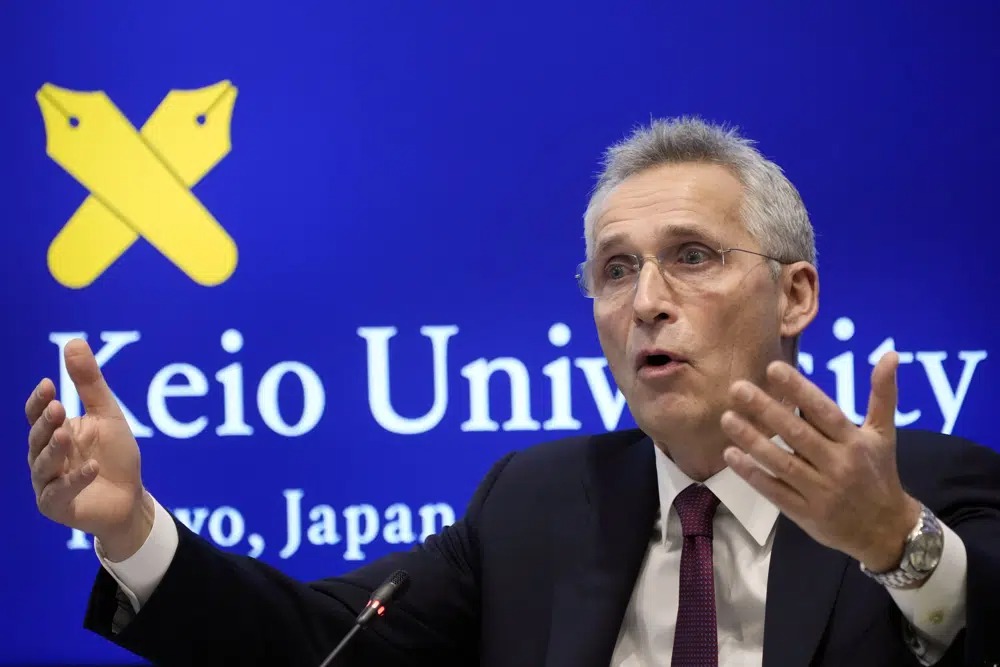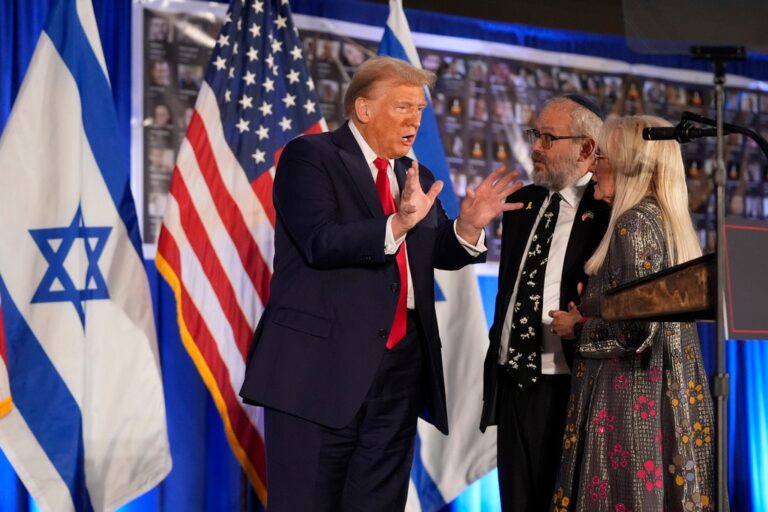China’s growing assertiveness and collaboration with Russia poses a threat not only to Asia but also to Europe, NATO Secretary-General Jens Stoltenberg said Wednesday as he sought stronger cooperation and more “friends” for NATO in the Indo-Pacific region.
Stoltenberg said China is increasingly investing in nuclear weapons and long-range missiles without providing transparency or engaging in meaningful dialogue on arms control for atomic weapons, while escalating coercion of its neighbors and threats against Taiwan, the self-ruled island it claims as its own territory.
“The fact that Russia and China are coming closer and the significant investments by China and new advanced military capabilities just underlines that China poses a threat, poses a challenge also to NATO allies,” Stoltenberg told an audience at Keio University in Tokyo. “Security is not regional but global.”
“NATO needs to make sure we have friends,” he said. “It is important to work more closely with our partners in the Indo-Pacific.”
China is increasingly working with Russia and they lead an “authoritarian pushback” against the rules-based, open and democratic international order, he said.
Stoltenberg said NATO does not regard China as an adversary or seek confrontation, and that the alliance will continue to engage with China in areas of common interest, such as climate change.
Chinese Foreign Ministry spokesperson Mao Ning defended China as “a force for regional and global peace and stability” and criticized NATO for labeling China a threat and for expanding its military ties to Asia.
“NATO has constantly sought to reach beyond its traditional defense zone and scope, strengthen military and security ties with Asia Pacific countries and played up China’s threats,” Mao said. “I would like to stress that the Asia-Pacific is not a battlefield for the geopolitical contest and does not welcome the Cold War mentality and bloc confrontation.”
Stoltenberg and Japanese Prime Minister Fumio Kishida held talks Tuesday and agreed to step up their partnership in security in cyberspace, space, defense and other areas.
Besides Japan, NATO is also strengthening “practical cooperation” with Australia, New Zealand and South Korea in maritime cybersecurity and other areas and stepping up participation of their leaders and ministers in NATO meetings, he said.
Kishida on Tuesday announced Japan’s plans to open a representative office at NATO.
Japan, already a close ally of the United States, has in recent years expanded its military ties with other Indo-Pacific nations as well as with Britain, Europe and NATO amid growing security threats from China and North Korea.
Tokyo was quick to join in U.S.-led economic sanctions against Russia’s war in Ukraine and provided humanitarian aid and non-combative defense equipment for Ukrainians. Japan fears that Russian aggression in Europe could be reflected in Asia, where concerns are growing over increasing Chinese assertiveness and escalating tensions over its claim to Taiwan.
Stoltenberg arrived in Japan late Monday from South Korea, where he called for Seoul to provide direct military support to Ukraine to help it fight off the prolonged Russian invasion.
North Korea condemned Stoltenberg’s visits to South Korea and Japan, saying that NATO was trying to put its “military boots in the region” to pressure America’s Asian allies into providing weapons to Ukraine.
North Korea also criticized increasing cooperation between NATO and U.S. allies in Asia as a process to create an “Asian version of NATO,” saying it would raise tensions in the region.
(AP)












One Response
The teams are lining up. Seems very much like 1938. Sino-Russian alliance (including Iran, Cuba and North Korea) versus the “as usual” disunited, unprepared and uncoordinated democracies of the Free World. Just as the Spanish civil war, the Italian conquest of Ethiopia and the Japanese invasion of China (note, all those invaded were not democracies) were the exhibition season, the Russian invasion of Ukraine is the “test case” for how the democracies will react. So far, the Sino-Russian plans have been knocked off course by the unexpected response from both the Ukrainians and the Free world. If the Free world, and the US in particular, show they are ready to oppose the bad guys, it will probably convince them not to start World War III — and if we are weak, it is an invitation to the barbarians that the gates are open for their new empires.
On the bright side, no one is running on a platform of “kill the Jews” (of course, if the goyim to destroy the world, I’m not sure we’ll be any better off).